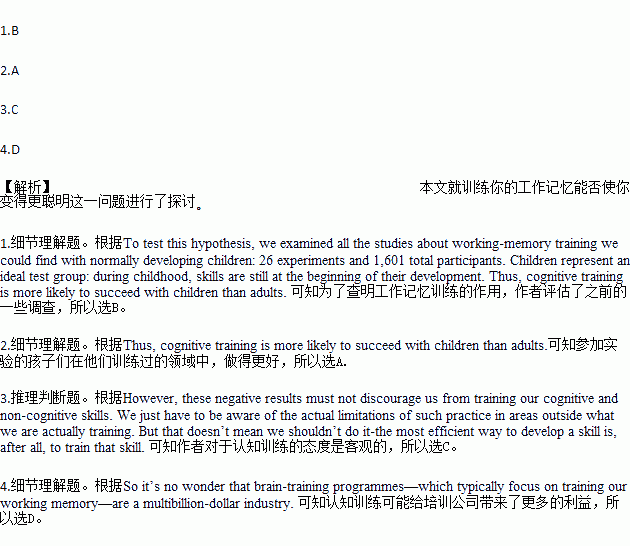题目内容
Can training Your Working Memory Make You Smarter?
We would all like to increase our cognitive(认知的)ability beyond the limits set by Mother Nature. So it’s no wonder that brain-training programmes—which typically focus on training our working memory—are a multibillion-dollar industry. But can this kind of training really make us smarter?
Cognitive training sees the brain as a kind of muscle that can be made stronger with the right kind of practice. It consists of tasks or games carried out on computers or smart phones. Despite much research, there has so far been no agreement about its effectiveness. Some think that cognitive training increases a broad range of cognitive abilities, while others less optimistic.
Yet we do know that some cognitive skills, such as working memory and intelligence, tend to go together and are predictors of real-life skills such as work performance. Thus, training one cognitive skill might lead to an improvement in many other cognitive and non-cognitive skills. That is exactly the underlying hypothesis(假设)on which working-memory training is based.
To test this hypothesis, we examined all the studies about working-memory training we could find with normally developing children: 26 experiments and 1,601 total participants. Children represent an ideal test group: during childhood, skills are still at the beginning of their development. Thus, cognitive training is more likely to succeed with children than adults.
The results were very clear. Working-memory training did not show any effect on children’s fluid intelligence, a person’s ability to solve new problems and adapt to new situations. It didn’t influence their academic achievement or other cognitive abilities, either. The only reliable effect was that children got better at what they trained to do. No more, no less. So performing working-memory tasks does seem to make you better at doing them. Nonetheless, the fact that participants got better at such tasks does not necessarily mean that their working-memory ability increased. They may just have learnt how to perform that particular type of task.
The results do indicate that the use of working-memory training programs as an educational tool is fruitless. More generally, together with other research, the results contribute to disproving cognitive training companies promises of a better brain.
The results have even more important implications theoretically. They question the hypothesis that training general cognitive mechanisms can affect other cognitive or real-life skills. Beyond working-memory training, other recent studies have shown the improving cognitive skills outside music-including academic skills.
However, these negative results must not discourage us from training our cognitive and non-cognitive skills. We just have to be aware of the actual limitations of such practice in areas outside what we are actually training. But that doesn’t mean we shouldn’t do it-the most efficient way to develop a skill is, after all, to train that skill.
1.To find out the effect of working memory training, the author ________.
A. made some scientific studies
B. reviewed the previous research
C. compared different test groups
D. got some children involved in the experiment
2.Children joining in the experiments were able to __________.
A. do better in the field where they are trained
B. obtain greater academic achievements
C. adjust to new situations quickly
D. succeed when they deal with real life problems
3.What is the author’s attitude toward the cognitive training?
A. Pessimistic B. Disapproving
C. Objective D. Optimistic
4.Cognitive training is likely to _______ according to the passage.
A. discover the secrets of human minds
B. make one’s brain stronger by way of practice
C. earn a good name for the training company
D. bring much profit to the training companies

